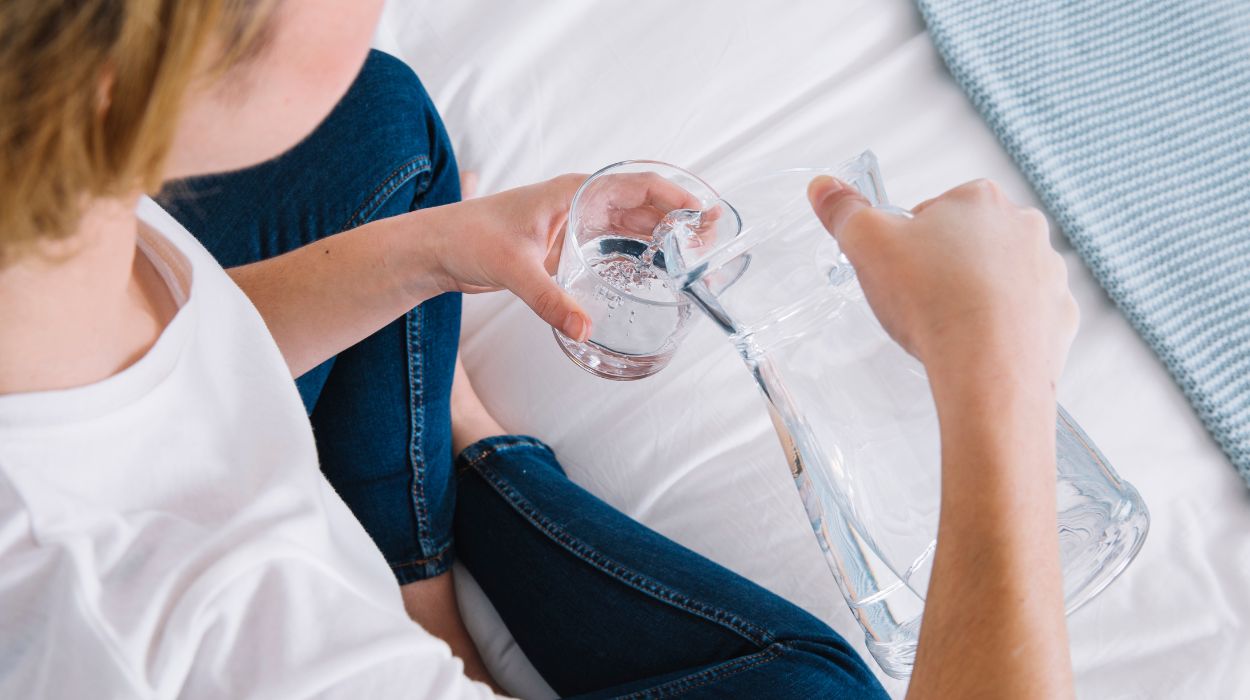 Evidence Based
Evidence Based
Evidence Based
This article is objectively based on relevant scientific literature, written by experienced medical writers, and fact-checked by a team of degreed medical experts.
Our team of registered dietitian nutritionists and licensed medical professionals seek to remain objective and unbiased while preserving the integrity of any scientific debate.
The articles contain evidence-based references from approved scientific sites. The numbers* in parentheses (*1,2,3) will take you to clickable links to our reputable sources.
Does Drinking Water Help Hair Growth? Here’s The Answer In 2024

Does water make your hair grow?
Our body needs water for numerous functions, but this article explores the specific connection between hydration and healthy hair growth. We’ll examine the importance of water intake and its role in promoting hair health.
We’ll dive into the depths and science and emerge with the answer to the age-old question: Does drinking water help hair growth?
Does Drinking Water Help With Hair Growth?
Does drinking water help your hair grow? This is a question that has floated around for ages. Water, the essential elixir of life, not only quenches our thirst but also nourishes our bodies and hair. Hydration is the key to healthy hair; drinking enough water is like giving every strand a tall drink of vitality. It promotes scalp health, stimulates hair growth, and prevents hair problems like dryness and breakage.
Does Drinking Water Help Hair Growth?
While staying hydrated is essential for overall health, there is limited scientific evidence to suggest that drinking water directly promotes hair growth. Hair growth primarily depends on factors such as genetics, hormonal balance, and the health of the hair follicles, including male hair follicles. While proper hydration is important for maintaining overall bodily functions, including those related to hair health, simply drinking more water is unlikely to have a direct impact on water and hair growth.
However, dehydration can potentially lead to dry, brittle hair, and a lack of moisture may contribute to hair breakage and damage. Therefore, maintaining adequate hydration levels by drinking water and consuming hydrating foods can indirectly support hair health by ensuring that the hair shaft remains moisturized and flexible.
Moreover, a well-balanced diet that includes essential nutrients such as vitamins, minerals, and proteins is crucial for promoting healthy hair growth. While water itself doesn’t contain these nutrients, consuming a nutritious diet alongside proper hydration can provide the essential building blocks necessary for strong, vibrant hair. Additionally, hydration plays a role in maintaining a healthy scalp environment, which is vital for optimal hair growth. Drinking water helps flush out toxins and promotes a balanced scalp pH, which can create a favorable environment for hair follicles to thrive.
In summary, while drinking water is important for overall health and can indirectly support hair health by preventing dehydration and maintaining a healthy scalp environment, it does not directly stimulate hair growth. A balanced diet, proper hydration, and a healthy lifestyle are essential factors to consider for maintaining healthy hair growth and overall well-being.
How Does Water Affect Hair Growth?

Water is a fundamental element of life, and its influence may extend beyond quenching our thirst. Our nervous system needs water to regulate body temperature,[1] but can it also help the complex hair growth process?
This section delves into the scientific aspects of how water affects hair growth of all hair types. Here are the mechanisms behind this intriguing phenomenon:
Hydration And Scalp Health
When the scalp is unhealthy and dry, it can lead to various scalp problems, such as dandruff,[2] itching, flakiness, and hair loss due to weakened roots. Proper hydration is essential for maintaining a healthy scalp environment.
Water hydrates[3] and helps prevent dehydration, dryness, and flakiness, which can impede hair follicle function and potentially lead to hair loss.
Blood Circulation And Nutrient Delivery
Poor blood circulation and insufficient nutrient delivery to the hair cells and roots can hinder hair growth. Inadequate blood flow restricts essential nutrients and oxygen supply, weakening roots and potentially causing hair fall.
Water intake[4] is an important factor influencing blood circulation, including the flow to your scalp. Improved blood circulation stimulates hair follicles[5] and enhances the delivery of essential nutrients and oxygen. This nourishment and prevention of nutrient deficiencies[6] support the vitality of hair follicles, leading to healthier, stronger strands.
Moisture Balance And Hair Shaft Health
Moisturizing the hair follicles is essential because it helps prevent dryness and dehydration of every hair strand.
Water aids in this moisture-balancing act within the hair shaft. As a stand-alone treatment, water is a good remedy. But using water with potent herbal treatments like aloe vera and hibiscus may be even better as natural oils[7] are infused into the hair shafts.
This ensures that the hair shafts remain shiny, strong, and lubricated. Proper lubrication reduces the risk of hair breakage, split ends, and overall damage, promoting healthier and longer hair.
Awesome Benefits Of Drinking Water For Hair

Water provides hair and scalp three main benefits: enhanced moisture, nutrition, and an improved blood supply. But that is not all!
Here are all the other awesome benefits you get from drinking water daily:
- Detoxification: Drinking lots of water will help your body eliminate toxins through sweating,[8] defecation, and urination.[9] Water, therefore, is excellent at helping flush out toxins and impurities from the scalp. This keeps it clean and promotes a healthy environment to support hair growth.
- Improves Elasticity: Hydration increases the elasticity of the hair strands, which is the extent your hair can stretch. Hair with elasticity resists breakage, as the hair strands are more resistant to damage caused by styling tools or environmental factors.
- Boosts Hair Volume: Well-hydrated hair appears fuller and voluminous due to the added water content. This adds body and bounces to your overall hairstyle.
- Enhances Hair Texture: Proper hydration improves the texture of your hair, making it smoother, silkier, and easier to comb and manage.
- Prevention of Hair Problems: Drinking water may help reduce the risk of hair breakage, split ends, and damage. This leads to healthier, more lustrous hair.
- Reduces Hair Thinning: Well-hydrated hair follicles are less prone to thinning and hair loss, promoting a fuller and thicker hair appearance.
How To Drink Water For Your Hair Effectively
Drinking a sufficient quantity of water every day is crucial for reaping its benefits for your hair. Here are some tips to help you add water to your daily routine:
- Drink more water throughout the day, aiming for the recommended daily intake of 15.5 cups for men and 11.5 cups for women. Strive to begin each morning by drinking water to kickstart your hydration. This supports brain function[10] and your body’s overall functioning, including hair follicles.
- Drink water before meals to aid digestion and nutrient absorption. This ensures your hair receives the essential vitamins and minerals it needs.
- Keep a water bottle with you to encourage regular sips and maintain hydration when on the go.
- Consider using hair supplements like biotin that boost collagen[11] and keratin[12] in the body to stimulate hair growth.
- Add a flavor twist and boost of nourishment by infusing your water with slices of fruits or seeds. These extra ingredients provide additional antioxidants and vitamins beneficial for your hair.
- Check the color of your urine as a hydration indicator. Aim for a pale yellow color to ensure you drink enough water, indicating proper hydration.
- Since you constantly lose water while exercising, increasing your water intake compensates for this expected fluid loss.
By adopting these good habits, you can ensure you drink more water for your hair’s well-being. Stay consistent, keep yourself hydrated, and let the benefits of water consumption flow through every single strand. Remember that a balance of water intake is the goal — too much water and dehydration[13] can also harm your health.
Incorporated Ways To Encourage Hair Growth
It will take more than just drinking more water daily to improve your hair and scalp health. It may help, but it works better when you complement your hair routine with other habits:
Maintain A Balanced Diet
Nutrition is key to excellent scalp and hair health. Consuming foods and beverages rich in the following will help:
- Vitamins A,[14] B, C, E,[15] and biotin provide a healthy antioxidant blend to minimize hair shedding.[16] Foods rich in these vitamins include brightly colored veggies, citrus fruits, eggs, nuts, and seeds.
- Minerals like iron, zinc, and selenium nourish hair. Deficiencies heighten the risk and induce hair loss.[17] Get enough of these minerals from meat, seafood, and Brazil nuts.
- Protein[18] makes keratin protein for healthy human hair growth. This fibrous protein is the foundation of the body’s hair, skin, nails, and other protective tissues. Protein is found in meat, chicken, fish, eggs, dairy, soy, beans, peas, and lentils.
Practice Scalp Massage
Massaging any part of your body stimulates circulation,[19] thus promoting blood circulation in the scalp. A scalp massage enhances nutrient delivery to the hair follicles. For best results, perform a scalp massage with your fingertips in a circular motion.
Shield Your Hair
When hair damage is further triggered by oxidative stress,[20] it could result in hair discoloration, hair breakage, and even hair loss. But you can easily shield your hair from hair-damaging factors like heat styling, harsh chemicals, and excessive tension.
To do this, use hair sprays with SPF during the hot weather, and always wear a hat or scarf as a protective cover.
Manage Stress Levels
High-stress levels[21] can contribute to hair loss as it pushes the hair growth phase to the resting phase. It is during this stage that hair falls off. To mitigate this, incorporate stress-reducing activities such as exercise, meditation, or hobbies regularly.
Use Suitable Hair-related Products
Similarly to using the best products for our skin, the quality of the hair products we also select matters. That said, choose the best hair quality products for your hair type. Also, pick one that addresses specific concerns like hair loss, thinning, or scalp dryness.
These conditioners, oils, and shampoos must be hydrating, nourishing, and gentle on your scalp. Be selective with the ingredient list, ensuring the hair product has no harsh chemicals and preservatives like parabens or phthalates that could further hinder healthy hair growth.
Spray The Hair With Water Daily
Finally, spraying your hair with water can support hair growth by moisturizing your dry scalp. To take this step further, use natural remedies like rice water[22] or other ayurvedic herbal sprints for your hair. These also nourish scalp health, shine the hair, and are potent at helping you detangle easily.
Conclusion
We cannot ever overstate water’s influence in promoting hair health and even helping treat some health conditions. Water truly is liquid gold!
Drinking about 2 liters of water daily is vital for maintaining a hydrated scalp and hair follicles. Adequate water intake facilitates nutrient delivery, supports blood circulation, and prevents dry hair and breakage.
Adequate hydration and balanced meals are rich in minerals and vitamins that nourish the hair from within, enhancing its strength, growth, and overall health.
Additionally, having a daily hair routine and focusing on staying consistent with your water intake can unlock water’s remarkable benefits. Remember, when you start drinking adequate water, it keeps the scalp healthy.
It also maintains the hair at a high water content helping with growth. So you have no excuse not to do it!
+ 22 sources
Health Canal avoids using tertiary references. We have strict sourcing guidelines and rely on peer-reviewed studies, academic researches from medical associations and institutions. To ensure the accuracy of articles in Health Canal, you can read more about the editorial process here
- Stachenfeld, N.S. (2014). The Interrelationship of Research in the Laboratory and the Field to Assess Hydration Status and Determine Mechanisms Involved in Water Regulation During Physical Activity. [online] 44(S1), pp.97–104. doi:https://doi.org/10.1007/s40279-014-0155-0.
- Limbu, S.L., Purba, T.S., Harries, M., Wikramanayake, T.C., Mariya Miteva, Ranjit Kaur Bhogal, O’Neill, C.A. and Paus, R. (2021). A folliculocentric perspective of dandruff pathogenesis: Could a troublesome condition be caused by changes to a natural secretory mechanism? [online] 43(10), pp.2100005–2100005. doi:https://doi.org/10.1002/bies.202100005.
- Meriem Benzarti, C. Pailler-Mattei, Jamart, J. and Zahouani, H. (2014). The Effect of Hydration on the Mechanical Behaviour of Hair. [online] ResearchGate. Available at: https://www.researchgate.net/publication/268361291_The_Effect_of_Hydration_on_the_Mechanical_Behaviour_of_Hair
- Nakamura, Y., Watanabe, H., Tanaka, A., Yasui, M., Nishihira, J. and Murayama, N. (2020). Effect of Increased Daily Water Intake and Hydration on Health in Japanese Adults. [online] 12(4), pp.1191–1191. doi:https://doi.org/10.3390/nu12041191.
- Stem Cells and Cloning: Advances and Applications. (2017). Hair follicle growth by stromal vascular fraction-enhanced adipose transplantation in baldness. [online] Available at: https://www.tandfonline.com/doi/full/10.2147/SCCAA.S131431
- Guo, E.L. and Katta, R. (2017). Diet and hair loss: effects of nutrient deficiency and supplement use. [online] pp.1–10. doi:https://doi.org/10.5826/dpc.0701a01.
- Thomas, A., Shithin, A., Varghese, Thomas, A., Abraham, E. and Varghese, A. (2017). Hair is an accoutrement, hair is jewelry, it’s an accessory-Realize ‘The killing effects of shampoo’. ~ 238 ~ Journal of Medicinal Plants Studies, [online] 5(2), pp.238–242. Available at: https://www.plantsjournal.com/archives/2017/vol5issue2/PartD/5-2-29-448.pdf.
- Kuan, W.-H., Chen, Y.-L. and Liu, C.-L. (2022). Excretion of Ni, Pb, Cu, As, and Hg in Sweat under Two Sweating Conditions. [online] 19(7), pp.4323–4323. doi:https://doi.org/10.3390/ijerph19074323.
- CDC (2022). Water and Healthier Drinks . [online] Centers for Disease Control and Prevention. Available at: https://www.cdc.gov/healthyweight/healthy_eating/water-and-healthier-drinks.html
- Mayo Clinic. (2022). How much water do you need to stay healthy? [online] Available at: https://www.mayoclinic.org/healthy-lifestyle/nutrition-and-healthy-eating/in-depth/water/art-20044256
- Zhang, J., Zhang, N., He, H., Du, S. and Ma, G. (2020). Different Amounts of Water Supplementation Improved Cognitive Performance and Mood among Young Adults after 12 h Water Restriction in Baoding, China: A Randomized Controlled Trial (RCT). [online] 17(21), pp.7792–7792. doi:https://doi.org/10.3390/ijerph17217792.
- Su Bin Hwang, Hyeon Ju Park and Lee, B.-H. (2022). Hair-Growth-Promoting Effects of the Fish Collagen Peptide in Human Dermal Papilla Cells and C57BL/6 Mice Modulating Wnt/β-Catenin and BMP Signaling Pathways. [online] 23(19), pp.11904–11904. doi:https://doi.org/10.3390/ijms231911904.
- Basit, A., Asghar, F., Saima Sadaf and M. Jaleel Akhtar (2018). Health improvement of human hair and their reshaping using recombinant keratin K31. [online] 20, pp.e00288–e00288. doi:https://doi.org/10.1016/j.btre.2018.e00288.
- Shaheen, N.A., Alqahtani, A.A., Hussam Assiri, Rayan Alkhodair and Hussein, M. (2018). Public knowledge of dehydration and fluid intake practices: variation by participants’ characteristics. [online] 18(1). doi:https://doi.org/10.1186/s12889-018-6252-5.
- VanBuren, C.A. and Everts, H.B. (2022). Vitamin A in Skin and Hair: An Update. [online] 14(14), pp.2952–2952. doi:https://doi.org/10.3390/nu14142952.
- Joël Pincemail and Smail Meziane (2022). On the Potential Role of the Antioxidant Couple Vitamin E/Selenium Taken by the Oral Route in Skin and Hair Health. [online] 11(11), pp.2270–2270. doi:https://doi.org/10.3390/antiox11112270.
- Davis, M., Piliang, M., Bergfeld, W.F., Caterino, T.L., Fisher, B.T., Sacha, J.B., Carr, G.J., Moulton, L.T., Whittenbarger, D.J. and Schwartz, J.H. (2021). Scalp application of antioxidants improves scalp condition and reduces hair shedding in a 24‐week randomized, double‐blind, placebo‐controlled clinical trial. [online] doi:https://doi.org/10.1111/ics.12734.
- Kondrakhina, I.N., Verbenko, D.A., Zatevalov, A.M., Gatiatulina, E.R., Nikonorov, A.A., Dmitry Deryabin and Kubanov, A.A. (2020). Plasma Zinc Levels in Males with Androgenetic Alopecia as Possible Predictors of the Subsequent Conservative Therapy’s Effectiveness. [online] 10(5), pp.336–336. doi:https://doi.org/10.3390/diagnostics10050336.
- Trüeb, R.M. (2021). ‘Let food be thy medicine’: Value of nutritional treatment for hair loss. [online] 13(6), pp.1–1. doi:https://doi.org/10.4103/ijt.ijt_124_20.
- The Journal of Alternative and Complementary Medicine. (2021). Implementation of Matrix Rhythm Therapy and Conventional Massage in Young Females and Comparison of Their Acute Effects on Circulation | The Journal of Alternative and Complementary Medicine. [online] Available at: https://www.liebertpub.com/doi/abs/10.1089/acm.2012.0932
- Trüeb, R.M. (2015). The impact of oxidative stress on hair. [online] 37, pp.25–30. doi:https://doi.org/10.1111/ics.12286.
- Eva M.J. Peters, Müller, Y., W. Snaga, Fliege, H., A. Reißhauer, Schmidt-Rose, T., Max, H., Schweiger, D., Rose, M. and Kruse, J. (2017). Hair and stress: A pilot study of hair and cytokine balance alteration in healthy young women under major exam stress. [online] 12(4), pp.e0175904–e0175904. doi:https://doi.org/10.1371/journal.pone.0175904.
- Kim, Y.-M., Kwon, S.-J., Jang, H. and Seo, Y.-K. (2017). Rice bran mineral extract increases the expression of anagen-related molecules in human dermal papilla through wnt/catenin pathway. [online] 61(1), pp.1412792–1412792. doi:https://doi.org/10.1080/16546628.2017.1412792.
- Saraf, S., Jharaniya, M., Gupta, A., Jain, V. and Saraf, S. (2014). HERBAL HAIR COSMETICS: ADVANCEMENTS AND RECENT FINDINGS. Saraf et al. World Journal of Pharmaceutical Research, [online] 3, p.3278. Available at: https://wjpr.s3.ap-south-1.amazonaws.com/article_issue/1400480434.pdf.



